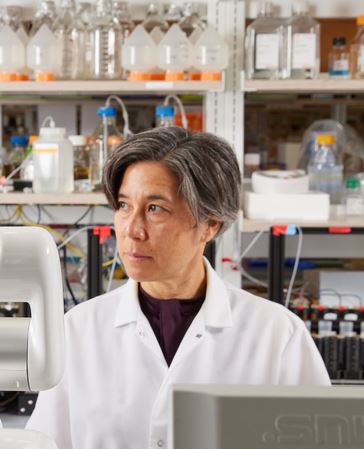Nation’s first training program for biological control workforce wins NSF grant
By Patrick L. Kennedy
With a competitive National Science Foundation Research Traineeship (NRT) award, Boston University is positioning itself to become a major hub not only in the emerging research field of biological feedback control, but also in the training of tomorrow’s engineering biology workforce.
“A Convergent Training Program on Biological Control,” co-directed by ENG Dean ad interim Elise Morgan (ME, MSE, BME) and Associate Professor Mary Dunlop (BME), aims to train a diverse group of PhD students—approximately 75 over the next five years—for tomorrow’s workforce in biotech, synthetic biology, manufacturing, robotics, sustainability, and other sectors. The agency announced the award this month. Professors Christopher Chen (BME, MSE) and Ahmad “Mo” Khalil (BME) are PIs along with Morgan and Dunlop.

Researchers working in biological control focus on understanding and replicating the remarkable abilities that living systems have to self-regulate and adapt by using feedback to respond to changes in their environment. From salamanders that can regrow a lost limb to bacteria that sense and move toward food sources, examples of feedback control abound in nature.
In recent years, researchers have been digging into the complex workings of feedback control as it occurs in nature, with an eye to effecting similar processes artificially. Potential applications include tissue regeneration, sustainable farming, decontaminating polluted water, designing microbes to produce sought-after chemicals in a sustainable manner, and developing assistive devices for the disabled.
However, despite all that promise, opportunities to learn feedback control as it applies in biological contexts are limited and ad hoc. Control theory traditionally sits within mechanical and electrical engineering curricula, where there isn’t room to delve into nature’s infinite array of biological control strategies. Meanwhile, biology students don’t typically get trained in the quantitative analysis of feedback mechanisms.

To bridge this gap, the BU team has proposed to create, and the NSF is investing nearly $3 million to facilitate, a first-of-its-kind graduate training program in biological control. The NRT program will feature all-new courses, boot camps, workshops, co-mentored research, and industry internships, all geared to advancing both the field of biological control and the position of BU graduates within it. The program will recruit students from underrepresented demographic groups as well as varied academic backgrounds, including mechanical, biomedical, and electrical engineering, biology, physics, chemistry, and data science, among others.
Through the integration of the disciplines involved, faculty and students will “develop a common language and shared body of technical skills in the fundamental underpinnings of biological control,” the team wrote in their proposal to the NSF. Moreover, the team expects new discoveries to result from the transdisciplinary research projects, broadening researchers’ understanding and potentially leading to new technologies in areas such as molecular-level control algorithms, microbial feedback control systems, self-powered hybrid systems that combine living and engineered parts, and advanced robotic systems that can heal and evolve.
The NRT award is one of just 22 the NSF granted this year. The program encompasses a wide range of experts from departments and centers across BU, including not only researchers but also participants from the Newbury Center, the Professional Development and Postdoctoral Affairs office, and STEM Pathways. Other ENG faculty involved include Professor Calin Belta (ME, SE, ECE), Professor Douglas Densmore (ECE, BME, MSE), Assistant Professor Andrew Sabelhaus (ME, SE), Assistant Professor Emma Lejeune (ME), Assistant Professor Sheila Russo (ME, MSE), Assistant Professor Tommaso Ranzani (ME), Assistant Professor Michael Albro (ME, MSE, BME), Assistant Professor Brianne Connizzo (BME), and Assistant Professor Jeroen Eyckmans (BME). Other BU faculty collaborators include LaDora Thompson (physical therapy), the Travis M. Roy Professor at the College of Health & Rehabilitation Sciences: Sargent College, as well as Assistant Professor Joe Larkin (biology), Assistant Professor Maria Kamenetska (physics), and Associate Professor Zeba Wunderlich (biology) from the College of Arts & Sciences.
“BU ENG’s focus on convergence—bringing people from many disciplines together to work on societal challenges—makes us uniquely positioned to bring the field of biological control from an emerging area to a mature discipline,” said Morgan, who is also the Maysarah K. Sukkar Professor of Engineering Design and Innovation, and director of the Center for Multiscale & Translational Mechanobiology, where the project will be headquartered. “We look forward to educating tomorrow’s leaders in this area and creating a training program that can be replicated at other universities too.”
